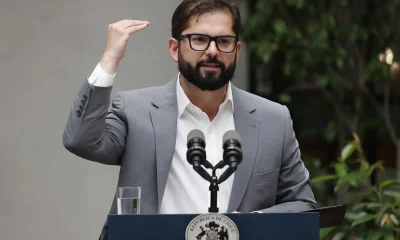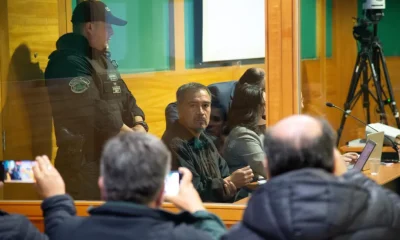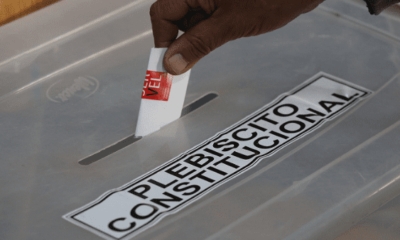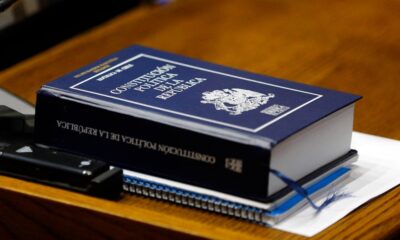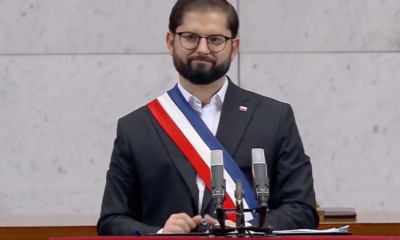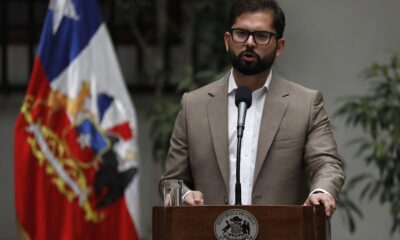International
Chilean President abandons his fiscal reform and presents new proposal
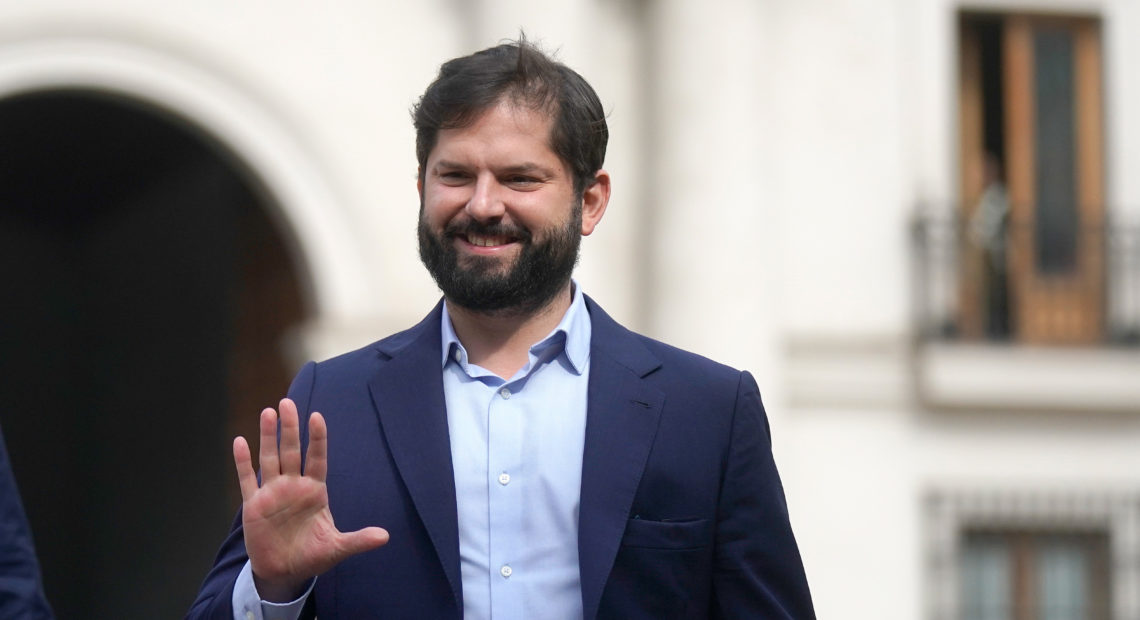
August 2|
Chilean President Gabriel Boric said on Tuesday that his government will not insist on a rejected tax reform bill and will promote new initiatives to raise the necessary funds to address some of its promised social proposals.
In June, the leftist ruler had said that his government would insist at the end of July in the Senate to resume the legislative processing of the tax adjustment.
Through a new Fiscal Pact, Boric said that the spending proposals involve resources for 8,000 million dollars to finance programs such as the Universal Guaranteed Pension to improve the lowest pensions, reduction of waiting lists in health, as well as greater investment in citizen security.
“This proposal considers the contribution made by growth, the reform of the state, the strengthening of tax oversight and taxes paid by the higher income sectors to be able to finance in this way the social expenses that are urgent,” he said in a televised speech.
“We are not going to insist in the Senate with the bill that was previously rejected”, he added.
Boric did not specify deadlines for the delivery and processing of the initiatives, or how much the total collection is expected to be.
The government’s new proposal will be divided into two projects, one to improve tax compliance and the other to adjust income tax focused on those with greater resources.
“This initiative will also include tax incentives for investment, productivity and formalization, as well as benefits for the middle class and a new regime for smaller companies,” he said.
He specified that the tax incentives would be equivalent to 0.5 points of the Gross Domestic Product (GDP).
The first project includes measures that seek to increase tax collection through legal modifications that do not imply a tax increase, which would increase tax collection by 1.5% of the GDP in net terms, according to a government minute.
Meanwhile, the second will be focused on income tax for both companies and individuals and will include incentives for investment, productivity and formalization, as well as benefits for the middle class and the new tax regime for smaller companies, which would have a fiscal cost of 0.5% of GDP.
At the investment level, tax incentives such as semi-instantaneous depreciation and a tax credit fund for investments with a multiplier effect on activity, employment and environmental sustainability are proposed.
It also commits to reduce by 30% the processing time for mining projects, according to the minutes.
Additionally, the plan includes five priority areas of productive diversification that by 2026 foresees three or four new lithium projects, two thirds of the energy matrix with renewable sources, 10-12 projects in the development of green hydrogen and an increase in the digital economy.
The original tax reform bill was rejected in March by the deputies and the government could only insist on its passage through the Senate.
International
U.S. Senate Rejects Budget, Bringing Government Closer to Shutdown Amid DHS Dispute

The U.S. Senate voted on Thursday against a budget proposal in a move aimed at pressuring changes at the Department of Homeland Security (DHS), following the killing of two civilians during a deployment of immigration agents in Minneapolis.
All Senate Democrats and seven Republican lawmakers voted against the bill, which requires 60 votes to advance, pushing the country closer to a partial government shutdown that would cut funding for several agencies, including the Pentagon and the Department of Health.
The rejection came as Senate leaders and the White House continue negotiations on a separate funding package for DHS that would allow reforms to the agency. Proposed measures include banning Immigration and Customs Enforcement (ICE) agents from wearing face coverings and requiring them to use body-worn cameras during operations.
The vote took place just hours after President Donald Trump said he was “close” to reaching an agreement with Democrats and did not believe the federal government would face another shutdown, following last year’s record stoppage.
“I don’t think the Democrats want a shutdown either, so we’ll work in a bipartisan way to avoid it. Hopefully, there will be no government shutdown. We’re working on that right now,” Trump said during a Cabinet meeting at the White House.
International
Trump Says Putin Agreed to One-Week Halt in Attacks on Ukraine Amid Extreme Cold

U.S. President Donald Trump said on Thursday that he secured a commitment from Russian President Vladimir Putinto halt attacks against Ukraine for one week, citing extreme weather conditions affecting the region.
“Because of the extreme cold (…) I personally asked Putin not to attack Kyiv or other cities and towns for a week. And he agreed. He was very pleasant,” Trump said during a Cabinet meeting broadcast by the White House.
Trump acknowledged that several advisers had questioned the decision to make the call.
“A lot of people told me not to waste the call because they wouldn’t agree. And he accepted. And we’re very happy they did, because they don’t need missiles hitting their towns and cities,” the president said.
According to Trump, Ukrainian authorities reacted with surprise to the announcement but welcomed the possibility of a temporary ceasefire.
“It’s extraordinarily cold, record cold (…) They say they’ve never experienced cold like this,” he added.
Ukrainian President Volodymyr Zelensky later commented on the announcement, expressing hope that the agreement would be honored.
International
Storm Kristin Kills Five in Portugal, Leaves Nearly 500,000 Without Power

Storm Kristin, which battered Portugal with heavy rain and strong winds early Wednesday, has left at least five people dead, while nearly half a million residents remained without electricity as of Thursday, according to updated figures from authorities.
The revised death toll was confirmed to AFP by a spokesperson for the National Emergency and Civil Protection Authority (ANPEC). On Wednesday, the agency had reported four fatalities.
Meanwhile, E-Redes, the country’s electricity distribution network operator, said that around 450,000 customers were still without power, particularly in central Portugal.
Emergency services responded to approximately 1,500 incidents between midnight and 8:00 a.m. local time on Wednesday, as the storm caused widespread disruptions.
The Portuguese government described Kristin as an “extreme weather event” that inflicted significant damage across several regions of the country. At the height of the storm, as many as 850,000 households and institutions lost electricity during the early hours of Wednesday.
Several municipalities ordered the closure of schools, many of which remained shut on Thursday due to ongoing adverse conditions.
Ricardo Costa, regional deputy commander of the Leiria Fire Brigade, said residents continue to seek assistance as rainfall persists.
“Even though the rain is not extremely intense, it is causing extensive damage to homes,” he noted.
In Figueira da Foz, a coastal city in central Portugal, strong winds toppled a giant Ferris wheel, underscoring the severity of the storm.
-

 Central America4 days ago
Central America4 days agoGuatemala Police Arrest Prison Guard Caught in the Act of Extortion
-

 Central America5 days ago
Central America5 days agoHonduras swears in conservative president Asfura after disputed election
-

 Central America5 days ago
Central America5 days agoBukele leads public trust rankings as UCA survey highlights gains in security
-

 International3 days ago
International3 days agoFootball Fan Killed in Clashes After Colombian League Match
-

 Central America3 days ago
Central America3 days agoGuatemala President Says Starlink Terminal Found Inside Prison
-

 International5 days ago
International5 days agoDoomsday clock moves to 85 seconds before midnight amid rising global risks
-

 International2 days ago
International2 days agoU.S. Senate Rejects Budget, Bringing Government Closer to Shutdown Amid DHS Dispute
-

 International5 days ago
International5 days agoWinter Storm Fern Leaves 30 Dead and Over One Million Without Power Across the U.S.
-

 Sin categoría4 days ago
Sin categoría4 days agoEight Killed in Series of Armed Attacks in Ecuador’s Manabí Province
-

 International5 days ago
International5 days agoSpain approves plan to regularize up to 500,000 migrants in Historic Shift
-

 International3 days ago
International3 days agoMissing Spanish Sailor Rescued After 11 Days Adrift in Mediterranean
-

 International3 days ago
International3 days agoRubio Says U.S. Could Participate in Follow-Up Russia-Ukraine Talks
-

 Sin categoría5 days ago
Sin categoría5 days agoEl Salvador Launches Fourth Year of Ocean Mission to Protect Marine Ecosystems
-

 Central America1 day ago
Central America1 day agoPanama Supreme Court Strikes Down Panama Ports Concession as Unconstitutional
-

 International2 days ago
International2 days agoStorm Kristin Kills Five in Portugal, Leaves Nearly 500,000 Without Power
-

 Central America1 day ago
Central America1 day agoU.S. and Guatemala Sign Trade Deal Granting Zero Tariffs to Most Exports
-

 International2 days ago
International2 days agoTrump Says Putin Agreed to One-Week Halt in Attacks on Ukraine Amid Extreme Cold
-

 International2 days ago
International2 days agoMan Arrested After Vehicle Crashes Into Jewish Institution in Brooklyn































